Main menu
Annual Report (2021- 2022)
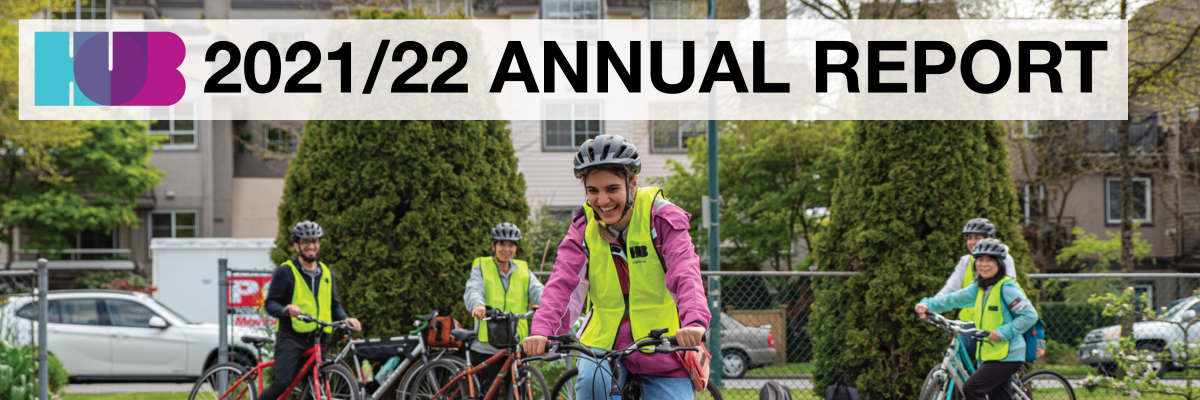
A MESSAGE FROM OUR PRESIDENT
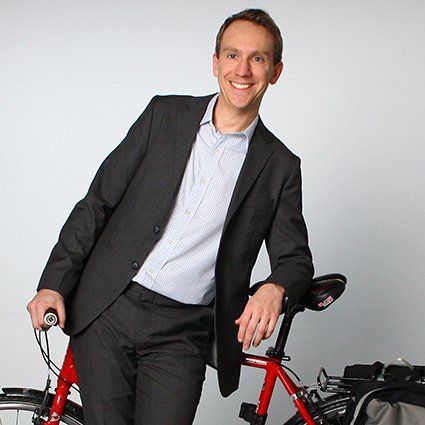
HUB Cycling’s 2021/2022 year saw the organization’s continued growth. While many programs and meetings remained in virtual format, we began the resumption of in-person events, meetings, and consulting. Year over year, revenues increased again, and our program reach grew significantly.
There are many programs to be excited about, but here are a few highlights:
- Our Bike Friendly Building and Research teams are working more closely than ever with many stakeholders, including health authorities, academics, municipalities, and corporate clients, to improve data collection, dissemination, maps, and building assessments. HUB Cycling’s Bike Friendly Building Consulting Services support developers, building managers, employers, business operators, property managers, and other stakeholders across Metro Vancouver to more fully promote and facilitate cycling and reward people who ride bikes for transportation. Recent Bike Friendly Building Consulting Service clients include QuadReal Property Group, Concert Properties, the New St Paul's Hospital and many more.
- The team recently completed an update to the State of Cycling GIS bike route mapping for Metro Vancouver and embarked on a follow-up to previous research to explore Cycling Equity in Older Buildings to remove end-of-trip facility barriers to people cycling more.
- Continued growth in our Bike Education program saw many new instructors brought on to help deliver our service in many municipalities locally, including Richmond, Coquitlam, Port Moody, Burnaby, and Delta to name a few. Beyond Greater Vancouver, programs are being delivered in Sunshine Coast, Squamish, Kelowna, Victoria & Kootenays. Our long-term strategy continues to be to deliver universal cycling education across the province.
- We were able to continue our fiscally stable operations thanks to adjustments made by staff and board. You’ll see more on this in the Treasurer’s report in this report and in our AGM presentation.
On behalf of the board, I want to thank all staff and volunteers for their efforts in helping us grow and continuing to help us get more people cycling more often.
- Derik Wenman
President, HUB Cycling
A MESSAGE FROM OUR EXECUTIVE DIRECTOR
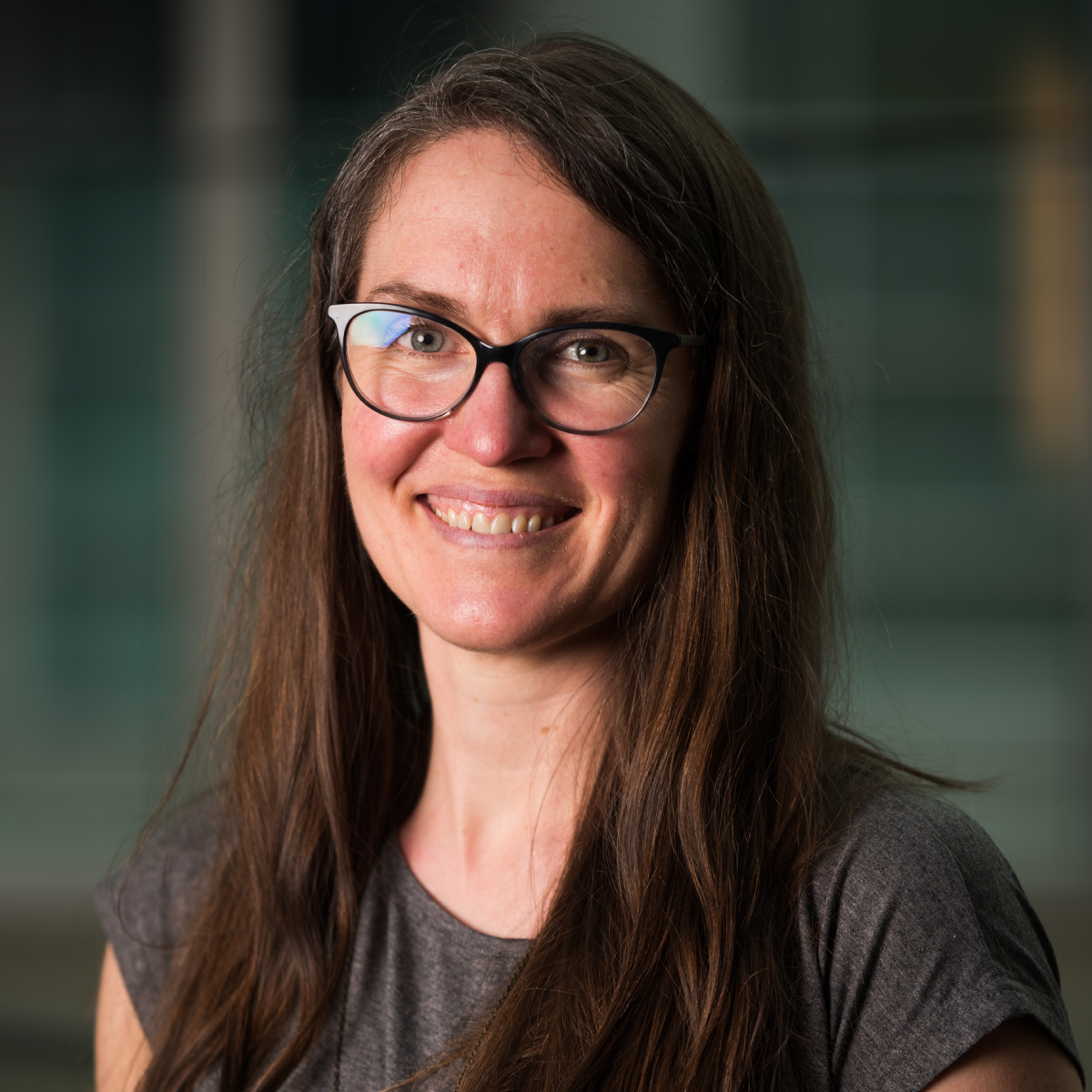
This year cycling continued to show its importance and resilience in overcoming increasingly intense challenges of affordability, equity, climate crisis, and covid recovery. Due to the long-standing efforts and relationships that HUB Cycling has built, decision-makers and the public recognize the value of cycling more than ever in supporting our communities and shared goals. The February 2022 Bike Awards event had more registered participants than ever before and 13 elected officials involved, showing the evolution of decision-makers wanting to be connected to the cycling community.
Our vision to achieve universal school cycling education is making progress, with over 14,000 kids trained from Metro Vancouver to Victoria and Kelowna areas, with the West Kootenays up next in the expansion. Data shows that participants are more likely to continue cycling for transportation after the courses, the lasting impact we aim for! In spring 2022, we launched the StreetWise Cycling Education Centre, our first in-person location with practice bikes available to improve equity and access for equity-deserving people, including adaptive bikes and training from Spinal Cord Injury BC. We partnered with Red Fox Healthy Living Society to provide cycling skills training and community asset mapping to urban Indigenous and racialized youth. We continue to provide online education to children and adults, removing geographic, scheduling and affordability challenges to folks accessing transportation cycling knowledge.
HUB Cycling was influential in improving policies supporting safe and connected cycling, including legislative reform to better education and holding all road users accountable. Research and analysis are underway to understand and promote equity of the cycling network and older building end-of-trip facilities, as well as cycling highways. HUB’s Bike Friendly Building and Research teams are working more closely than ever with many stakeholders, including health authorities, academics, municipalities, and corporate clients, to improve data collection, dissemination, maps, and building assessments. Updates were made to the groundbreaking State of Cycling report bringing together all government jurisdictions to better understand and collaborate on moving cycling forward and show the progress made to UnGaptheMap in the past year.
To better represent the Metro Vancouver population, HUB Cycling formed a Youth Advisory Committee, and HUB Cycling Local Committees sent 82 letters to government decision-makers through the year, engaging and influencing bike-friendly progress.
Our work to get more people cycling more often is more important than ever and I’m so grateful to the volunteers, members, donors, staff and board that are creating healthier, happier and more connected communities.
- Erin O'Melinn
Executive Director, HUB Cycling
Our Voice: Our Supporters Make a Difference
HUB Cycling supporters, volunteers and members continue to help give us a solid voice to positively impact the cycling landscape of Metro Vancouver. Our close to 2,800 individual members, 21,000+ social media followers, 47,000+ newsletter subscribers, and 11 volunteer Local Committees amplify our message that municipalities must prioritize safe cycling for all ages and abilities.
This past September, after a vote from our membership, we restructured our membership program by replacing our annual memberships with a lifetime, low-barrier entry membership. This shift is helping broaden the diversity of our membership to more accurately reflect Metro Vancouver's demographics and is increasing our impact by growing our membership numbers and advocacy voice.
Not currently a lifetime HUB Member?
Amplify our voice by joining HUB Cycling for as little as $10.
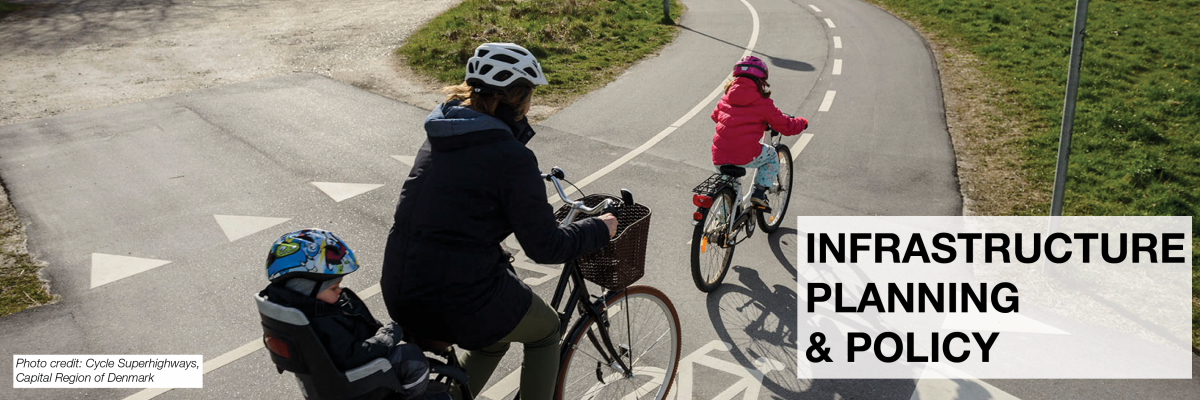
HUB Cycling continued to build on our influence on all things cycling, engaging in several important projects and initiatives and seeing the successful completion of a range of infrastructure projects for people cycling.
The advocacy team added more capacity with the creation of a Community Organizer position. This provides more support for capacity building with local committees while freeing more staff time to focus on infrastructure improvements.
Infrastructure Successes
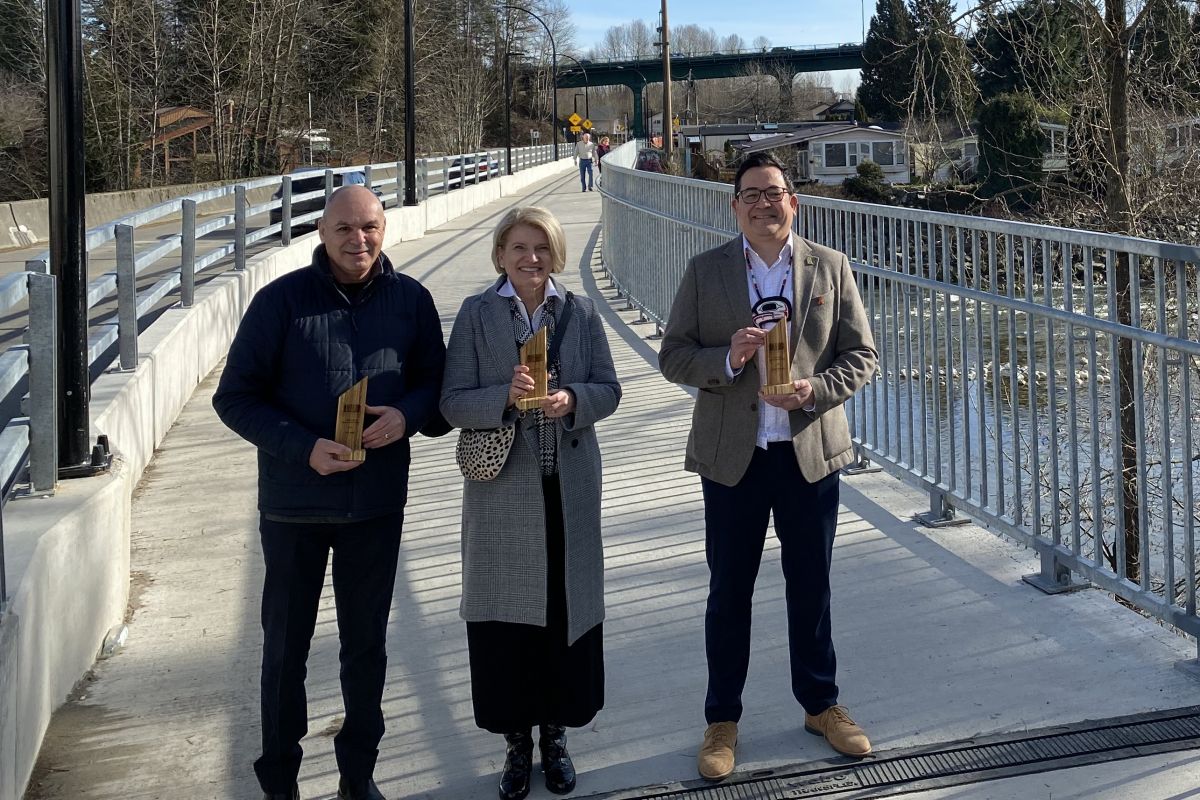
2021 saw several infrastructure upgrades for people cycling across Metro Vancouver, helping to #UnGapTheMap and improve the connection, comfort, and safety of crucial cycling infrastructure, including:
- Burnaby completed the Still Creek Active Transportation Improvement Project & the Gilmore Overpass
- Surrey added protected bike paths on 32 Avenue
- New Westminster added the interim Agnes Greenway
- The Ministry of Transportation and Infrastructure added multi-use paths to Lower Lynn, Fern Street, and Main Street interchanges on the North Shore
Three infrastructure projects won at HUB Cycling’s ninth annual bike awards for improving cycling:
- The City of Vancouver for the Richards Street Bikeway
- The City of Coquitlam for the King Albert Greenway Extension
- The Welch Street Bridge, a joint project between the District of West Vancouver, Park Royal, and Squamish Nation
#UnGapTheMap
Taking the #UnGapTheMap initiative to a new level, HUB Cycling completed an extensive project Making the Case for Cycling Highways in Metro Vancouver. Drawing on case studies from North America and Europe, the project envisions the possibility of upgrading an entire route to the highest quality bikeway that is safe, convenient, fast, comfortable, and easy to use any time of the day or night all year round. We researched the demand for cycle highways, benefits, best practices, and the connections to micromobility and tourism. This was coupled with a GIS analysis examining the potential to upgrade existing routes to cycle highways, drawing on findings from our equity analysis of the bikeway network, areas with significant destinations, and bike routes that most closely matched the cycle highway criteria. The cycle highway webpage includes links to the full report, project highlights, the press release, and supporting quotes from local decision-makers including Mayor Jonathan Cote, Shauna Sylvestor and Kay Teschke. Media mentions include a web article on CBC and this interview with Global TV:
This year also saw the most successful Adopt-a-Gap campaign. This was the most adoptions we’ve had in one period, with fifty-one people contributing to the campaign. The November campaign matched historical contributions, almost doubling the total amount raised through Adopt-a-Gap since it began.
We continued to work closely with decision-makers, including the provincial government, TransLink, Metro Vancouver and municipalities, to improve policies, increase funding, and build better infrastructure for people cycling.
There are over 300 priority gaps in Metro Vancouver's broken bike network identified by HUB Cycling's Local Committees in critical need of upgrades.
You can help by adopting a gap for as little as $50.
Local Committee Highlights
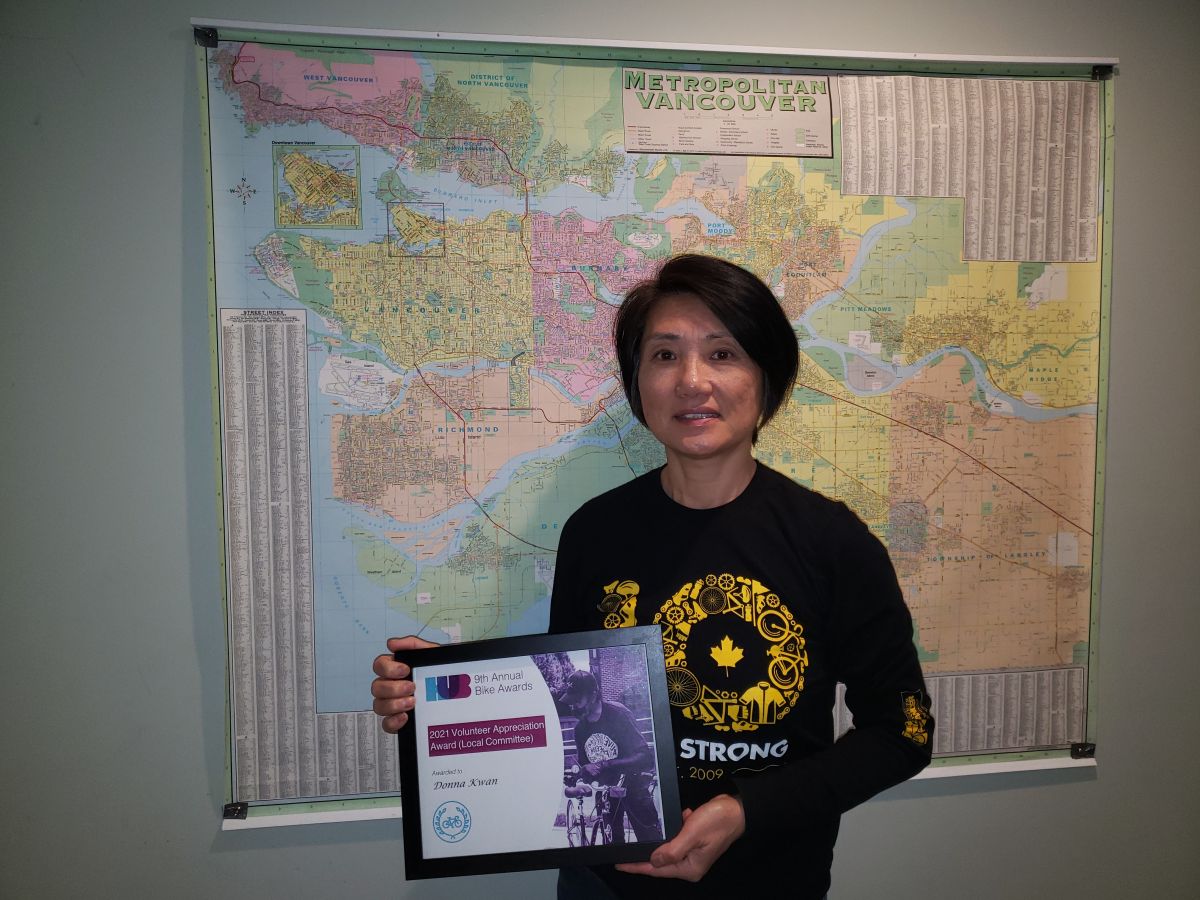
HUB Cycling’s 10 Local Committees continued their tireless efforts to push for better regional cycling infrastructure. For the first time since the Covid-19 pandemic began, all of our committees met regularly. Committee members continued their advocacy work through the tumultuous pandemic, consulting with the Ministry of Transportation and Infrastructure and meeting with tourism departments, Chambers of Commerce, elected officials, municipal staff, TransLink, and Metro Vancouver to advocate for a safe and complete cycling network across the region.
Committees were actively involved in providing feedback and pushing for improvements to the replacement Pattullo Bridge project, cycling facilities along the Surrey-Langley SkyTrain corridor, Kitsilano Beach Seaside Greenway, Massey Tunnel Replacement Project, the Agnes Greenway project, Kent Avenue in Vancouver, Mary Hill Bypass, and routes along the North Shore Committee’s 3 Priority Bikeways, to name a few. Committees also worked to provide feedback on cycling-related plans, proposals, and budgets, including Delta’s Cycling Infrastructure Study (initially a request from the local committee), which has now led to the Delta Cycling Master Plan, paired with a massive increase in the municipal budget for cycling infrastructure, increasing by more than double from $700k to $1.6 million.
The unpredictable nature of the pandemic led to a reduction in the number of in-person events and rides, but some committees still organized socially distanced rides, events, and gatherings. Local Committees wrote 65 advocacy letters to city councils, municipal staff, Metro Vancouver, school districts, media outlets, MoTI, and provincial ministers advocating for better cycling infrastructure. Three volunteers from Richmond, New Westminster, and the Tri-Cities were recognized for their advocacy work at HUB’s 9th annual Bike Awards, with one winner featured in local media.
During this period, a new Youth Advisory Committee (YAC) was created and facilitated by staff. The creation of a new committee from scratch is no easy feat, and over the past seven months, there have been various successes and challenges that the committee has faced. Still, the committee has focussed on creating a survey to understand the travel habits and barriers to getting more youth cycling. They have also participated in events including the Vancouver School Board Sustainability Conference and Hats Off Day in Burnaby.
We'd like to thank our 2021-22 Local Committee Chairs:
- BURNABY: Cathy Griffin (to Mar 2022), Blake Standard (from Jul 2022)
- DELTA: Neil Pope, Roel Schootman
- LANGLEY: Mitchell Nurse (to Dec 2021), Tony Bisig (from Jan 2022)
- MAPLE RIDGE - PITT MEADOWS: Ivan Chow (to Mar 2022), Barry Bellamy (to Aug 2022), Jackie Chow (from Apr 2022)
- NEW WESTMINSTER: Andrew Feltham, Garey Carlson
- NORTH SHORE: Don Piercy
- RICHMOND/YVR: Anna Chow, Cat Rey (to Sep 2021), Donna Kwan (from Oct 2021)
- SURREY / WHITE ROCK: Tim Yzerman
- TRI-CITIES: Andrew Hartline, Colin Fowler
- VANCOUVER / UBC: Jeff Leigh
- Youth Advisory Committee (YAC): Nic Huige
HUB Cycling has 11 Local Committees across Metro Vancouver, made up of volunteers working to improve cycling in their communities.
The committees meet monthly and work to make cycling safer and more attractive for everyone. We're always looking for more people, and no experience is required to join!
Join a Local Committee near you.
Engagement Activity
Staff and board members provided feedback and engagement on a range of projects across Metro Vancouver, complementing the advocacy work of the local committees.
HUB Cycling worked with the Ministry of Transportation and Infrastructure (MoTI), providing feedback on the Highway 99 Tunnel program and several related projects, and giving feedback on the preliminary design for the tunnel to ensure the highest quality facilities for active transportation users. HUB Cycling helped MoTI identify and classify hundreds of gaps on and around MoTI infrastructure and provided feedback on the provincial e-scooter pilot and data collection possibilities for active transportation.
In the fall of 2021, we put together a recommendation letter for the 2022 budget. The result in the budget was more funding for active transportation. Funding for the BC Active Transportation Infrastructure Grant program was increased by eight million, and funding for provincial active transportation marketing and programming doubled to four million.
HUB Cycling encouraged people across the province to write to their elected councillors and mayors to support a ‘safe passing distance’ motion at the Union of BC Municipalities. More than 1,220 people from 42 different municipalities in B.C. wrote more than 11,000 letters to their local politicians, asking them to support the resolution. The motion was passed at UBCM and included in their recommendations to the province.
Locally, HUB Cycling provided feedback on Metro 2050, Metro Vancouver’s update to the Regional Growth Strategy. We gave suggestions on phase III of Transport 2050, reviewed the draft Major Bikeway Network (MBN) update, and discussed connections between the MBN and cycle highways with TransLink.
As well, HUB Cycling gave recommendations for Clean BC’s Roadmap to 2030 and the Federal Active Transportation Strategy and Funding and shared best practices to Accommodate People Cycling during Construction Work.
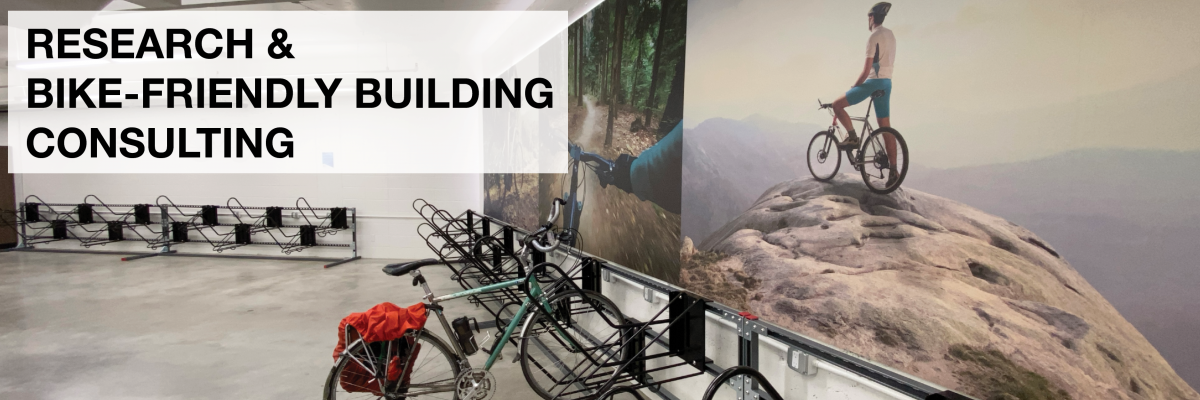
HUB’s Research Program
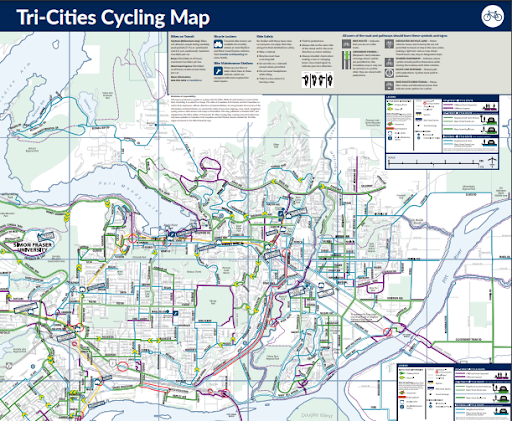
In 2021 and 2022, HUB Cycling continued our progress in instigating and completing practical, targeted research in support of our organizational mandate to make cycling more accessible to all people. The Research team working with strategic partners, updated and added value to our State of Cycling regional cycle route network GIS data set and initiated new research into issues of equity related to inadequate cycling amenities in buildings developed in previous decades.
With TransLink funding support, HUB Cycling was again able to update our State of Cycling GIS data set based on infrastructure improvements made by regional municipalities during 2021. The currency of the dataset is being maintained through our annual updates. Based on our success in developing a new regional cycling map for TransLink early in 2021, the City of Coquitlam contracted HUB to develop a Tri-Cities cycling map, also working with Port Coquitlam and Port Moody municipal staff. The Tri-Cities map is built on the quality and universal classification system developed through our original State of Cycling project, adding information about local community amenities and route planning considerations such as steep slopes. The new Tri-Cities map was completed by March, and HUB assisted in distributing thousands of copies to schools, community centers, bike shops, and places of worship.
In 2021 QuadReal and Concert Properties started the ball rolling on a new research focus, offering substantial initial funding for a project focusing on cycling and equity. Based on the many contacts HUB receives about inadequate cycling amenities in many existing residential and commercial buildings around the region, we confirmed a new Cycling Equity and Older Buildings research project. Through 2021 HUB gained additional private sector funding for the project, along with a grant from the Real Estate Foundation of BC. Securing a UBC academic research team to join the project through a Mitacs federal internship placement was the final step in building resources, and the project is now underway in collaboration with diverse partner organizations. The team is identifying buildings, interviewing managers and residents, and compiling related data for the reports broad Summer-Fall 2022 release.
Bike Friendly Building Consulting
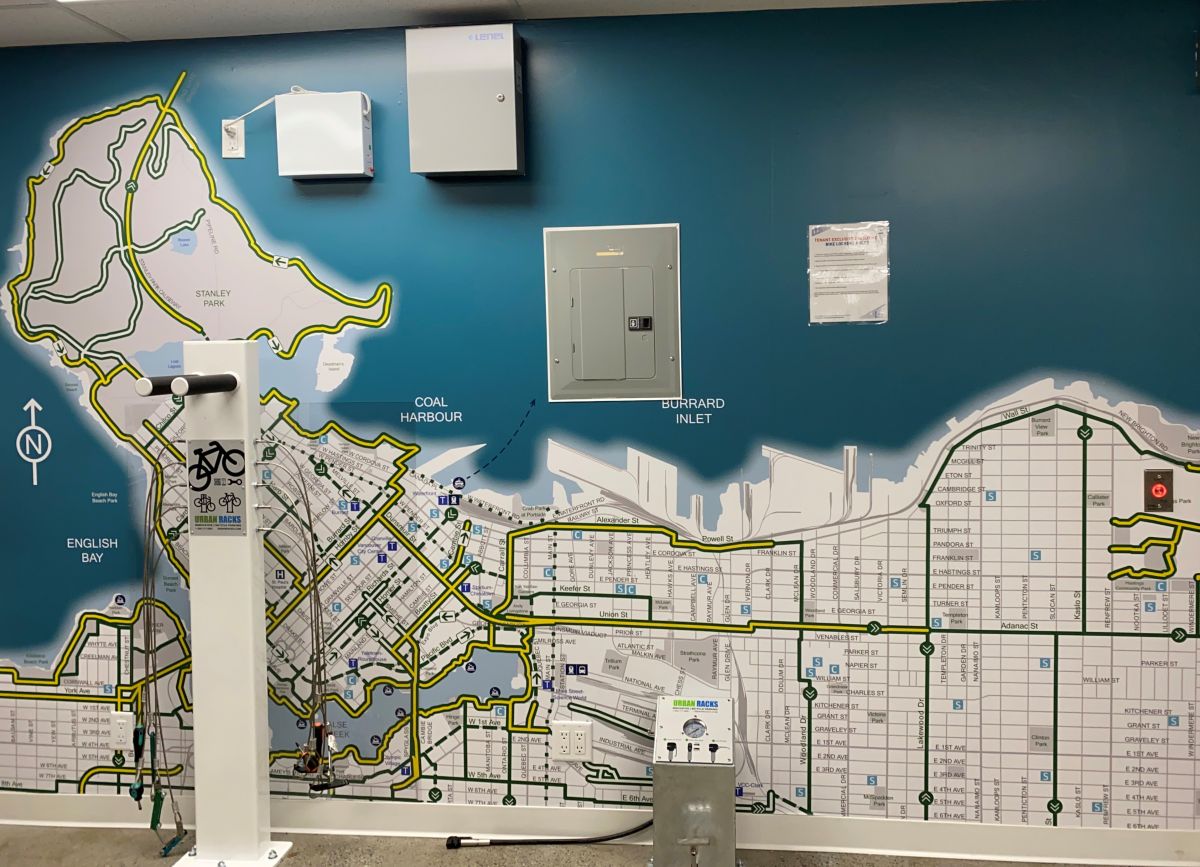
HUB’s unique Bike Friendly Building consulting service grew and evolved in 2021 and 2022, serving an increasingly diverse range of clients and building types and certifying one new Platinum and two new Gold BFB buildings. During the year, HUB completed BFB assessment reports for 12 public schools, two hospitals, one government office building, and numerous residential and mixed-use private sector projects, including redevelopments and major new developments. HUB’s team also advised final installations for both Bentall Centre and “The Smithe” by Boffo Developments based on prior year assessments. We then re-assessed both buildings and confirmed Gold status for the former and Platinum for the latter. The two buildings and the new New Westminster High School, which also received a Gold, were profiled in HUB’s 2022 Bike Awards.
HUB Cycling’s goal is to continue developing and growing the Bike Friendly Building program, so we may serve more clients and help create more bike-positive buildings in Metro Vancouver and beyond. We have made great strides in that goal through federal Mitacs student placements with Capilano University Business Program students. Through 2021 a Capilano University intern completed valuable research with current and potential BFB clients about confirming our market niche, further developing our product, and expanding our client base. Early in 2022, HUB implemented a targeted marketing campaign developed by the intern, including a new website presence, promotional videos and brochures, and social media engagement. In May 2022, HUB engaged another Mitacs Capilano University intern specializing in sales funnel development to reach out directly to new potential clients.
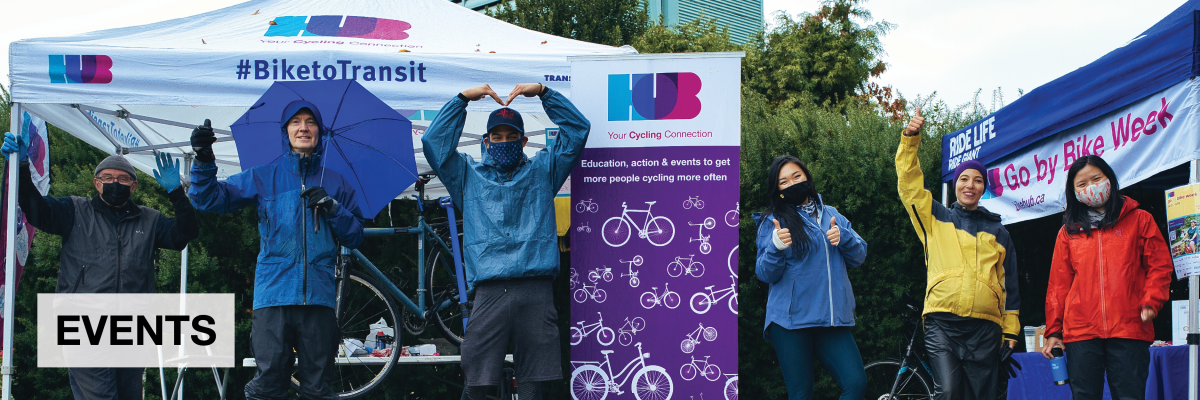
Go by Bike Week
May 31-June 6, 2021 and September 27-October 3, 2021
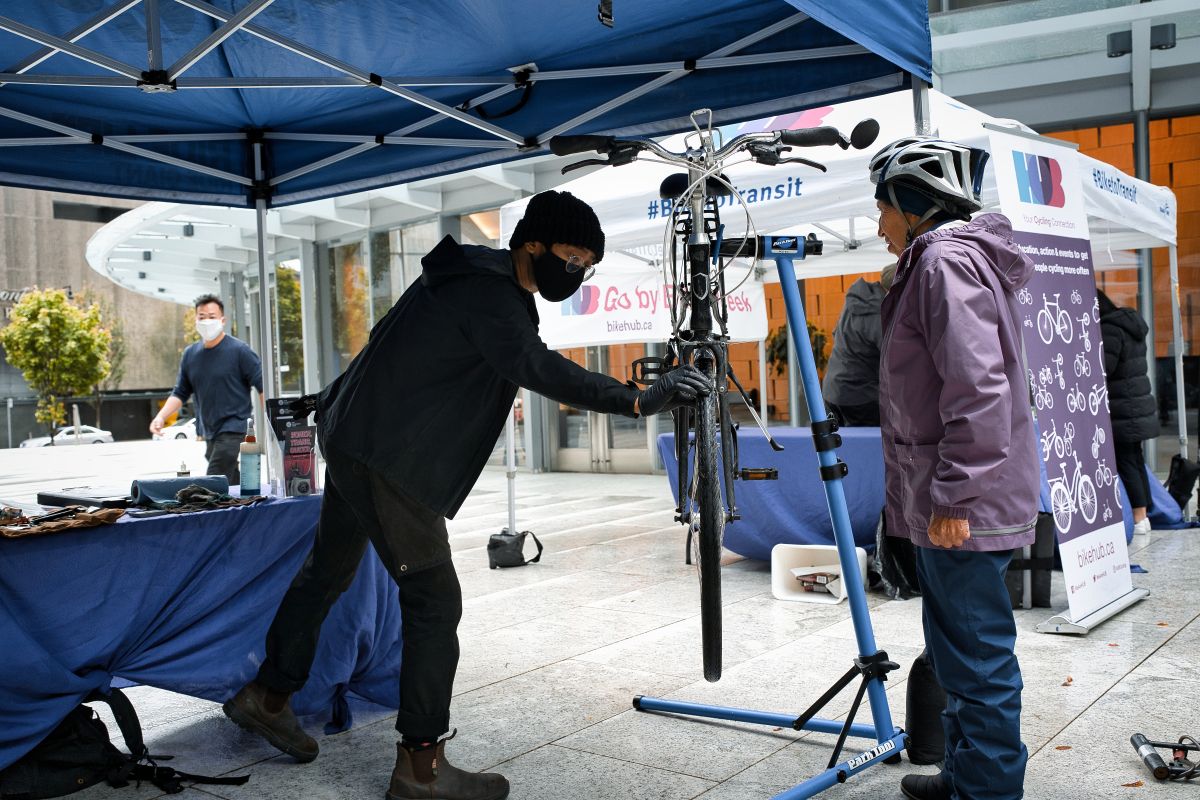
Go by Bike Week is a bi-annual event that motivates local residents across Metro Vancouver to try cycling more often for all kinds of trips. Since 2007, the campaign has motivated over 165,000 participants to cycle, along with over 25,000 people trying cycling for transportation for the first time. Previously known as ‘Bike to Work Week’, HUB Cycling decided to re-brand to ‘Go by Bike Week’ to make the event more inclusive and align with our overall mission to get more people cycling more often.
In Spring 2021, Go By Bike Week presented a ‘digital first’ campaign, with over 5,000 participants, 38 online activations, and 40+ prizes. Our Fall Go by Bike Week offered a traditional in-person event, with 3,088 participants and over 4,000 people stopping by one of our 23 Knowledge HUB stations to receive free basic bike maintenance from local mechanics, free snacks and coffee, cycling maps, giveaways, entry to win additional prizes, and more. HUB Cycling also implemented new strategies to engage with new audiences, such as marketing the event in multiple languages and offering free online cycling webinars and courses, such as StreetWise Cycling Online for adults and Learn2Ride Online for youth. For the first time ever, HUB Cycling was delighted to support and promote three Women, Trans & Queer bike maintenance nights during Go by Bike Week hosted by our community partners.
Spring Go by Bike Week Highlights:
5,314 total participants
51% women & non-binary participants
61,629 kg of greenhouse gas emissions saved
290,823 km cycled during Go by Bike Week
Fall Go by Bike Week Highlights:
3,088 total participants
51% women & non-binary participants
28,100 kg of greenhouse gas emissions saved
129,593 km cycled during Go by Bike Week
Bike to Shop
August 7 - 22, 2021
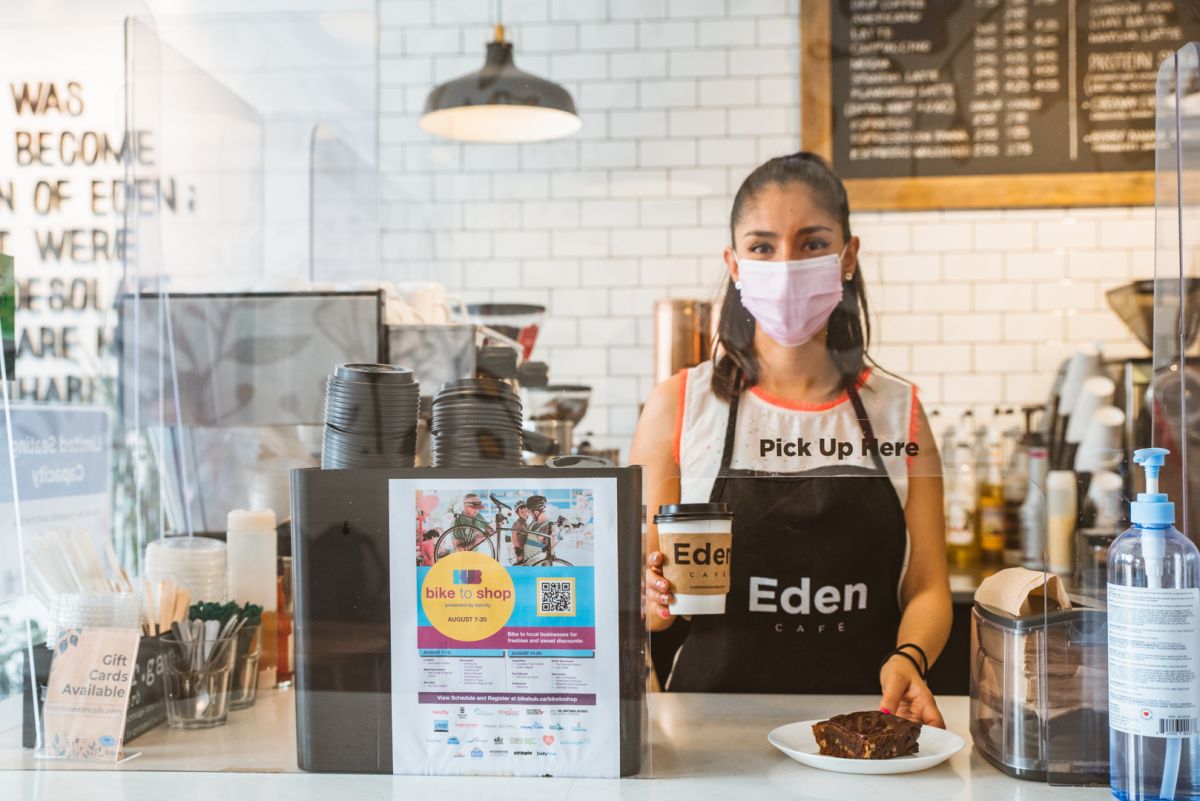
Bike to Shop is designed to encourage residents to visit their local stores across Metro Vancouver by Bike. Since 2016, Bike to Shop has encouraged over 22,700 people to cycle to local businesses. This behavior change campaign aims to encourage residents to continue biking to shops after the event by sharing knowledge of bike routes, safe bike parking & how to transport items by bike.
Bike to Shop is made up of Shop Local Challenges in different retail districts. This year, we ran our biggest Bike to Shop event to date. During the week, participating businesses offer a small reward to participants who bike to the store during the event. The event adds additional vibrancy to the retail district and brings customers directly to businesses. In 2021, 1,500 people stopped by businesses, and nearly 700 people stopped by the physical activations. 120 businesses took part across 20 neighborhoods and 10 municipalities, with 95% saying they would take part again in 2022.
Bike Awards
February 24, 2022
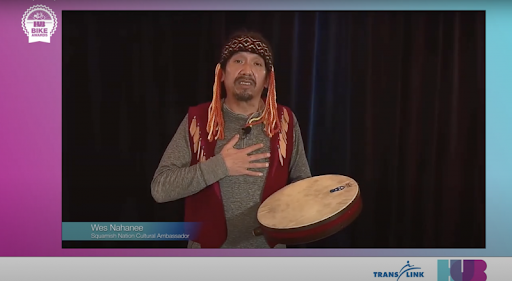
HUB Cycling’s Virtual Bike Awards returned for its 9th year in 2022. The event celebrated the organizations and individuals that made cycling more comfortable and safer for people of all ages and abilities across Metro Vancouver. It also showcased personal stories and highlighted community successes. More than 300 people across Metro Vancouver registered to attend the free awards ceremony on February 24th from 7 to 8:30 PM.
This year’s Bike Awards was hosted by CBC video journalist Uytae Lee, a contributor to the CBC’s Early Edition on urban planning issues in Vancouver. New this year, we were joined by Squamish First Nations Cultural Ambassador, Wes Nahanee, who performed the welcoming ceremony. Twelve elected officials from across the region also presented awards to recipients. This significant representation of elected officials supported our deepening of relationships with decision-makers, allowing us to have an even greater impact through our advocacy efforts.
All of our winners can be found on our website.
Key Highlights:
- 323 people registered
- 10 Metro Vancouver municipalities won awards
This year, the Honorable Bowinn Ma, Minister of State for Infrastructure and North Vancouver-Lonsdale MLA was awarded the Arno Schortinghuis Cycling Champion of the Year Award for her dedication to improving cycling conditions. Watch her acceptance video below.
Bike to School Week
May 31-June 4, 2021
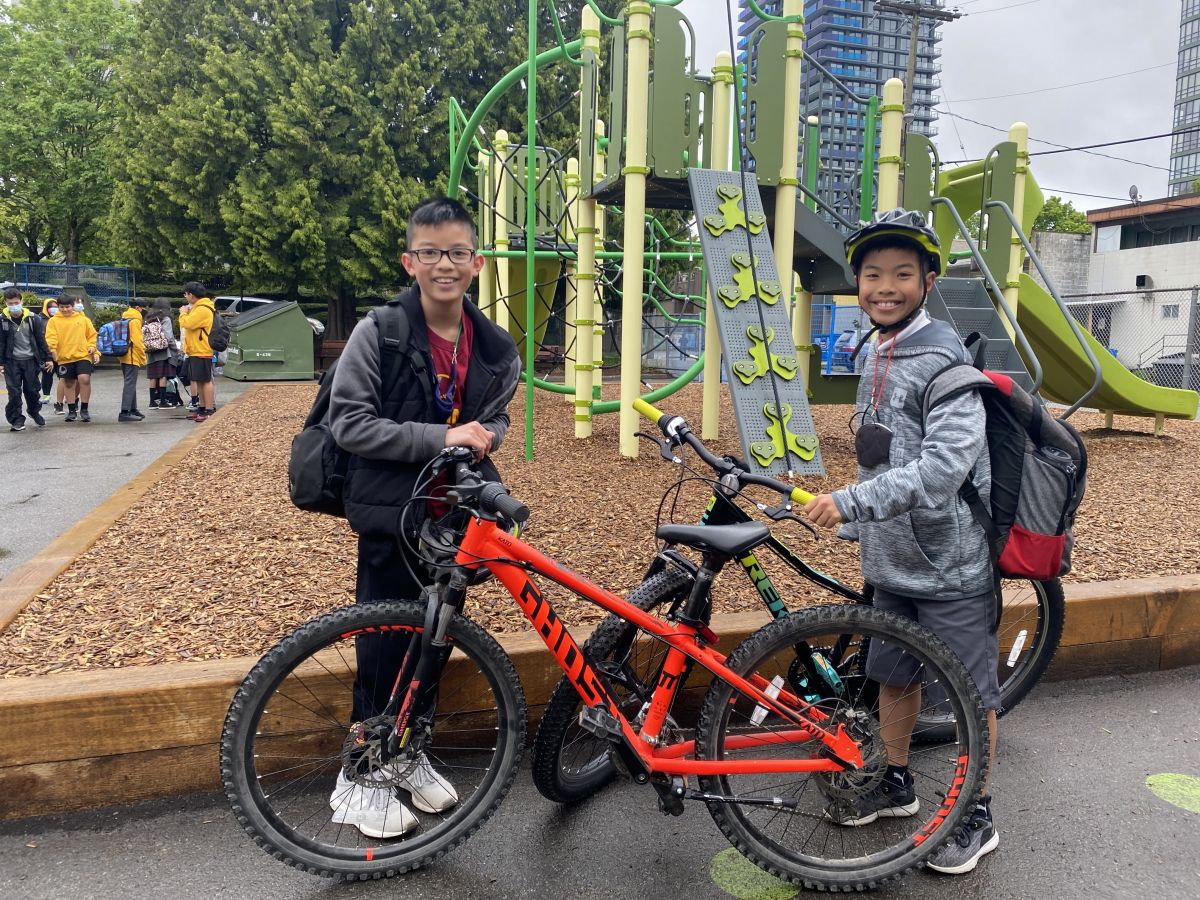
Bike to School Week is an annual celebration across Metro Vancouver where students of all ages bike, roll, or walk to school. The event is a great way to enhance green initiatives already happening at schools, build community, and highlight the benefits of active transportation - like less congestion and healthy, energised students. After a tough year and a half for both students and teachers who dealt with school closures, online learning amongst the external pressures of the pandemic, many schools reported that Bike to School Week was the perfect event for reconnecting with their communities in 2021. We had 126 schools take part in 2021, making it the biggest Bike to School Week in HUB Cycling history.
Key Highlights:
- 126 schools participated
- 28 schools participated for the first-time
- 40,498 bike trips were recorded (an average of 325 trips per school)
- 13,710 riders participated (an average of 111 riders per school)
- 15,046 other active travel trips recorded (walking, scootering, skateboarding etc.)
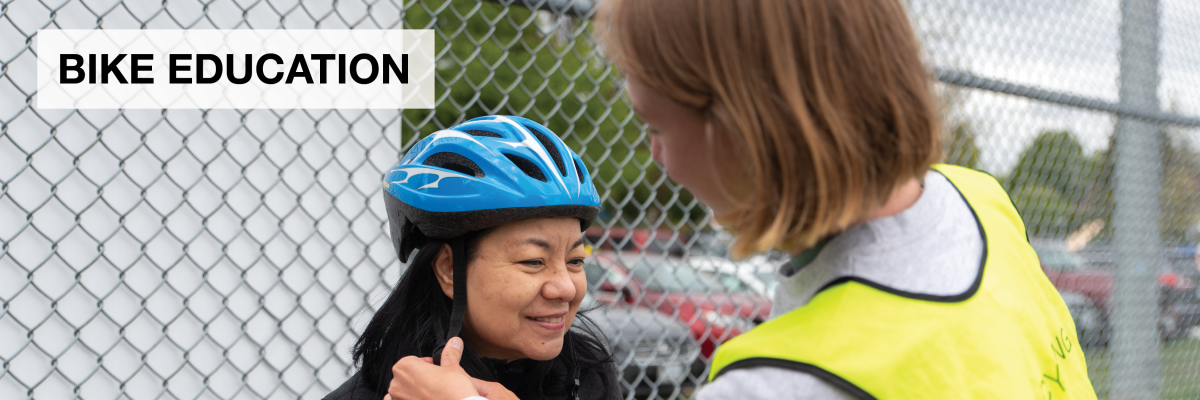
StreetWise Cycling Courses
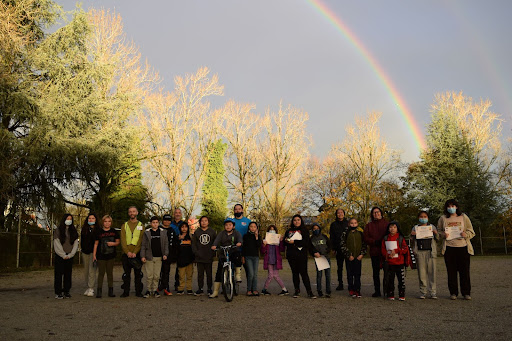
StreetWise Cycling programs aim to get more people cycling more often, through supportive and engaging on-bike education or fun and interactive virtual courses. A limited number of in-person programs were able to run during pandemic restrictions but HUB Cycling's virtual offerings continued to provide safe and effective cycling education throughout the year.
While challenged with coordinating in-person courses amidst changing public health protocols, HUB launched a new public course called Beginner Bike Skills in the summer of 2021. Five small group sessions were offered to people who were new to riding bikes or lacked basic handling skills. Replacing private lessons, these courses were much more affordable and simpler to coordinate. They were held completely off-road, in a safe and comfortable environment for new riders with Mobi by Shaw Go bikes or rented bikes from a nearby rental store. Participants consistently shared positive feedback, but reported their desire for more lessons and for bikes that were more easily accessible. This led to the development and subsequent funding of the 2022 StreetWise Cycling Education Centre at Trout Lake Community Centre. The new centre provides a wider range and number of courses, with on-site bicycles to support adults in their journey towards becoming confident urban bike riders.
We also ran a total of eighteen virtual webinar courses with several new topics including Intro to E-biking, Route Planning and Basic Bike Maintenance. These webinars were consistently popular with an average of 52 attendees per webinar. Another virtual resource, StreetWise Cycling Online, launched in May 2021 with over 250 people enrolled as of March 2022. This free educational resource was created to help adult riders gain the knowledge and skills needed to start their urban cycling journeys with confidence. Participants were able to learn from the safety of their own space, at their own pace, on any device with an internet browser. Additionally, we also delivered a total of 13 Workplace Cycling Workshops or custom courses for a range of organizations from the University of British Columbia to FedEx and DoorDash.
After a postponement in 2020, 10 youth leaders and a 34 younger children participated in two cohorts of the Indigenous Youth Community Asset Mapping 8-week program. Vancouver’s Greenest City Grant funded the development and delivery of this partnerned program with Red Fox Healthy Living Society. Participants were oriented to Vancouver’s cycling culture and provided with formal instruction in cycling and bike maintenance. They then planned and went on a series of community mapping guided rides in their neighbourhood. We also provided bikes and accessories that they used during the instructional sessions which were then kept after the program.
Key Highlights:
- 1,397 participants reached
- 53 courses
- 2,068 total hours of participation
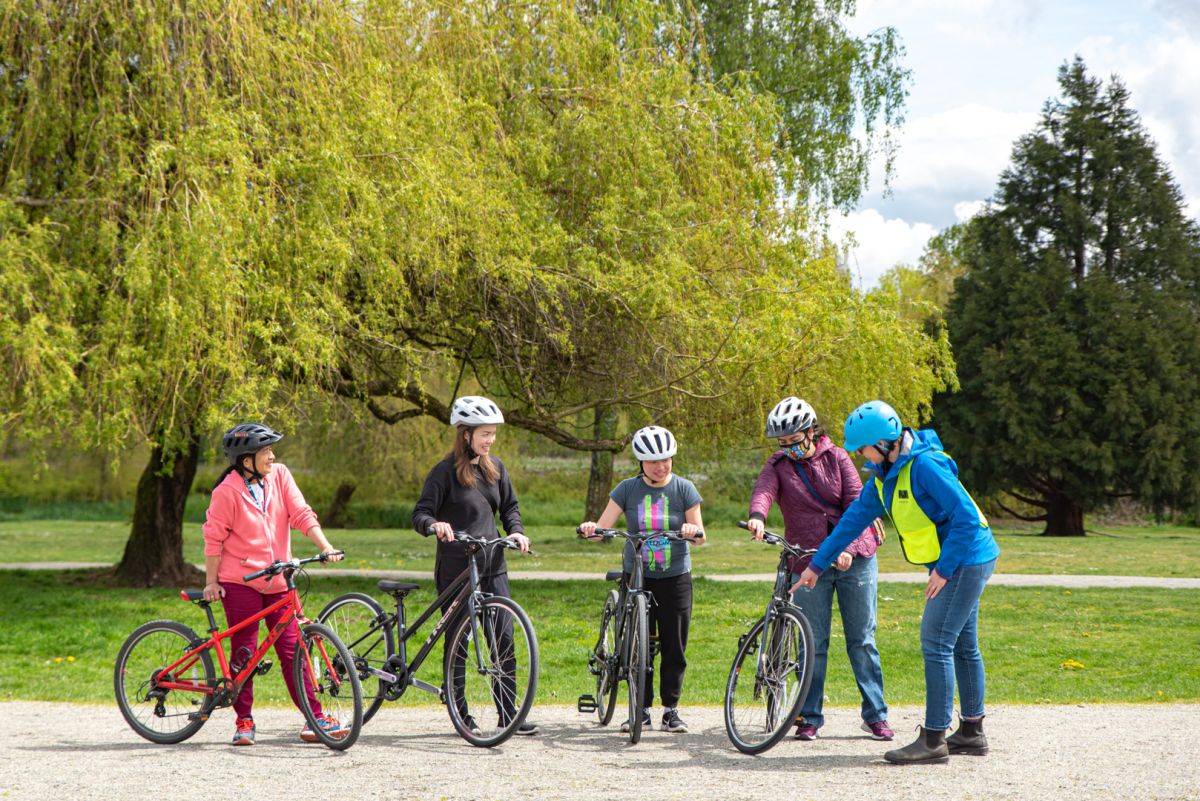
Newcomer Bike Mentorship Program
In 2021 HUB Cycling in partnership with the Immigrant Services Society of BC (ISSofBC) launched our Newcomer Bike Mentorship Program to match people experience in urban cycling with recently arrived immigrants and refugees to learn about getting around by bike in our region. The program is funded for three years by the Public Health Agency of Canada (PHAC), and is also supporting Newcomer Bike Mentorship matches in Toronto and Halifax with local delivery partners. Each mentorship match lasts 3 months, and is carefully supported by HUB and ISSofBC staff. Newcomers received safe cycling training, and each was given a bike refurbished by Our Community Bikes along with a helmet and a lock. Mentors and newcomers are encouraged to meet weekly for a ride or another cycling related activity. In 2021 the program was delivered from the ISSofBC Welcome Centre, matching 28 newcomers with 24 mentors. During the graduation ceremony program participants shared inspiring stories from the program. In 2022, HUB and the ISS of BC added a second delivery location out of the ISS of BC's Coquitlam location allowing more newcomers to gain knowledge and enthusiasm for urban cycling. HUB Cycling and the ISS of BC are engaging an independent academic evaluator to assess the outcomes for participants, with the ultimate goal of promoting the model for delivery in other Canadian cities.
Bike to School
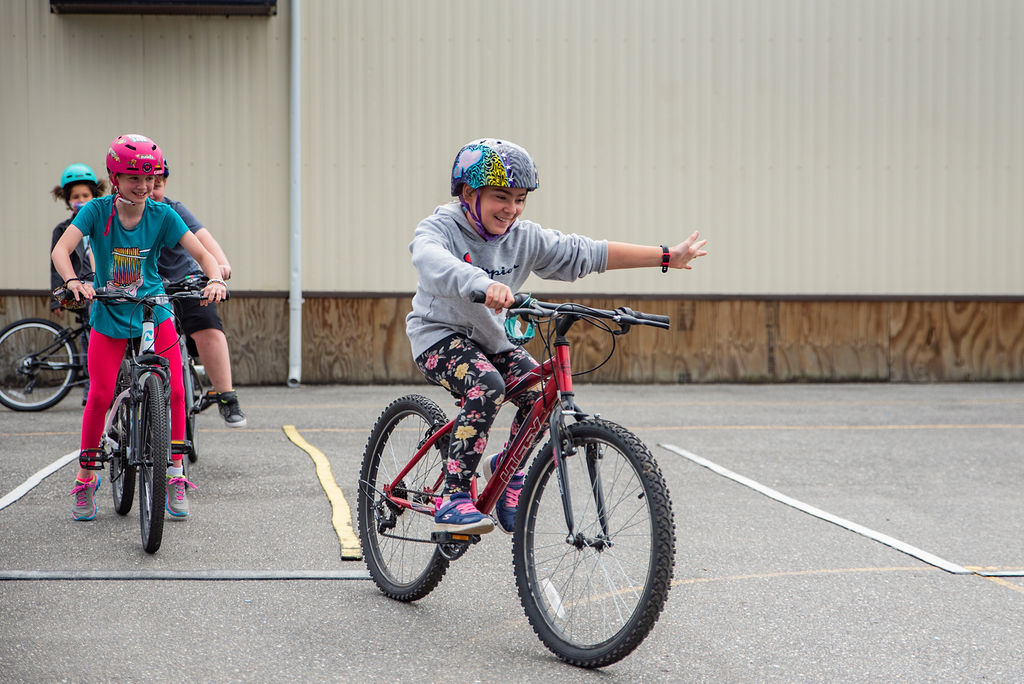
HUB Cycling’s Bike to School program enables and encourages thousands of Metro Vancouver youth annually to see cycling as a safe and enjoyable mode of transportation in their community. This program rebounded quickly from a challenging 2020 year, and even delivered courses to 14% more schools compared to 2019. This translated to 96 schools in 2021, reaching over 9,500 elementary and middle school students. In other words, this gave almost half (42%) the target population of public school students in Metro Vancouver the opportunity to participate in one of HUB Cycling’s Bike to School courses. Over 80% of participating teachers witnessed improved cycling skills and/or increased awareness of cycling rules and safety, after the course among participating students.
As we entered the 2021 spring season (March-June), sustained pandemic protocols in schools and the community continued to affect course delivery. HUB Cycling responded by only offering programs outdoors or in a blended format in order to minimize COVID-19 risks for participants and Instructors. Unfortunately, several large school districts were not able to accept even outdoor programming. However, by the fall season, every school board was ready to welcome our programs back with most schools opting for full in-person courses. In October, HUB Instructors also travelled outside of Metro Vancouver for the first time, delivering courses in Squamish and the Sunshine Coast as part of the Everyone Rides Grade 4-5 initiative.
Key Highlights:
- 9,519 youth received an on-bike program
- 96 schools reached
- 21 municipalities involved
Everyone Rides Grades 4-5
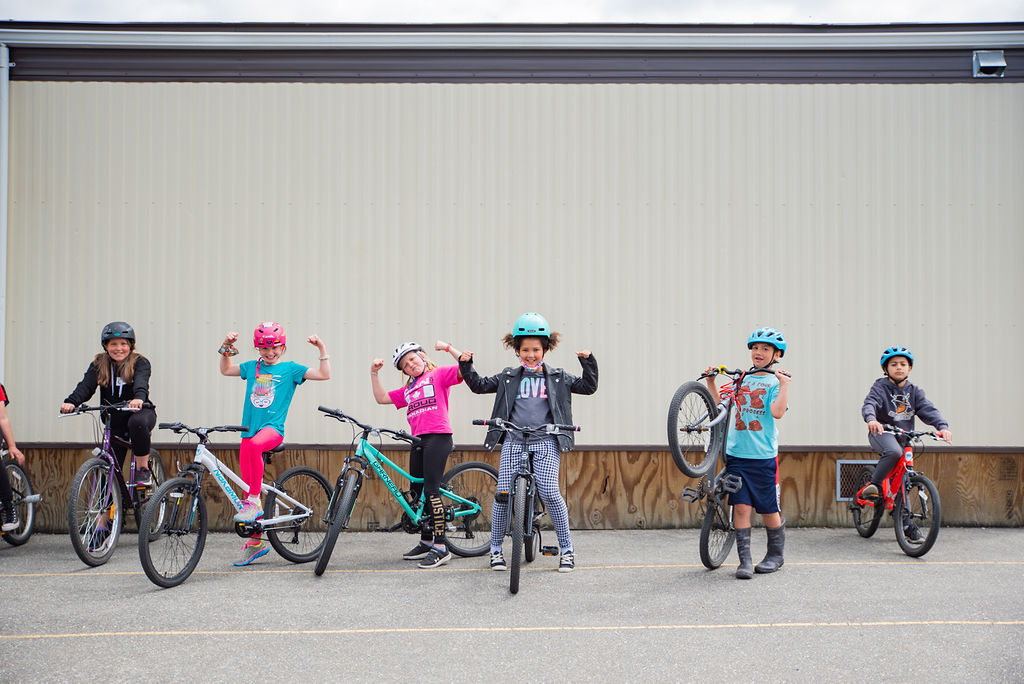 Together with our delivery partners, HUB Cycling delivered 87 Everyone Rides Grade 4-5 courses to almost 8,000 students over the spring and fall of 2021 in and around Metro Vancouver, the Sunshine Coast, Squamish, South Okanagan and Southern Vancouver Island. In November of 2021, the Ministry of Transportation and Infrastructure renewed their commitment to the program for spring 2022 with funding for 60 schools in and around Metro Vancouver, the Capital Regional District and 1-2 other sites to be determined. By early 2022, we established our new site in the West Kootenays (with delivery partner Kootenay Mountain Biking) and our new delivery partner in Kelowna (Elevation Outdoors).
Together with our delivery partners, HUB Cycling delivered 87 Everyone Rides Grade 4-5 courses to almost 8,000 students over the spring and fall of 2021 in and around Metro Vancouver, the Sunshine Coast, Squamish, South Okanagan and Southern Vancouver Island. In November of 2021, the Ministry of Transportation and Infrastructure renewed their commitment to the program for spring 2022 with funding for 60 schools in and around Metro Vancouver, the Capital Regional District and 1-2 other sites to be determined. By early 2022, we established our new site in the West Kootenays (with delivery partner Kootenay Mountain Biking) and our new delivery partner in Kelowna (Elevation Outdoors).
Key Highlights:
- 7,768 youth received an on-bike program
- 87 courses taught
- 19,420 total hours of participation
Financials
To view HUB Cycling's financial position from April 1, 2021 to March 31, 2022, please click here.
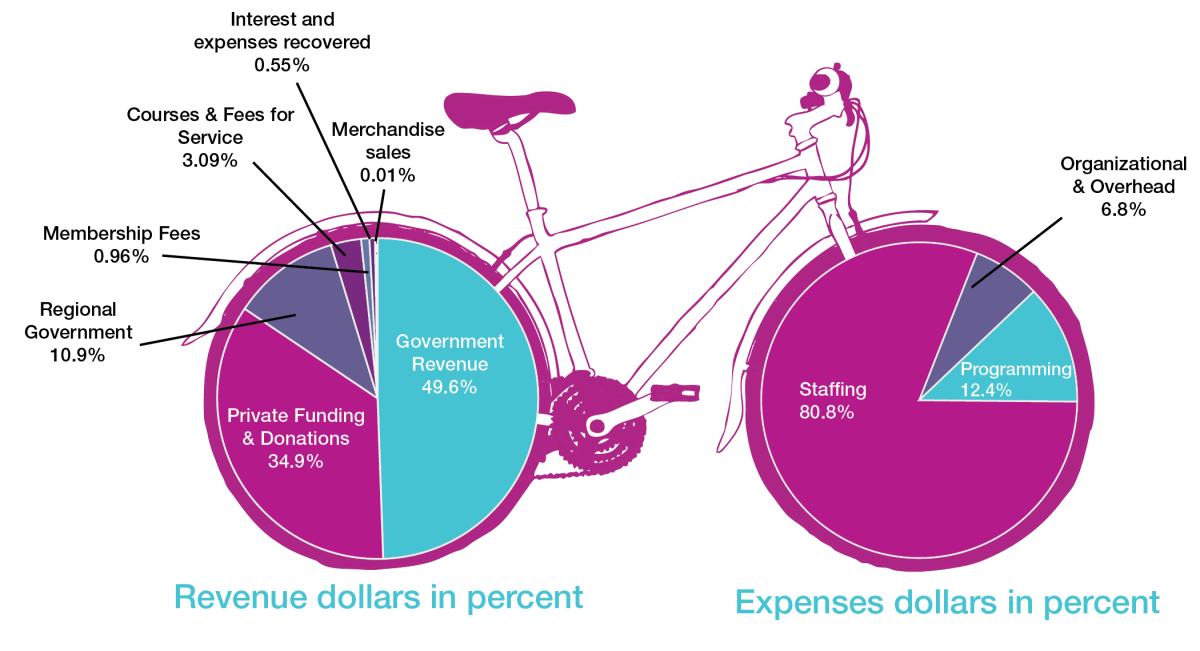
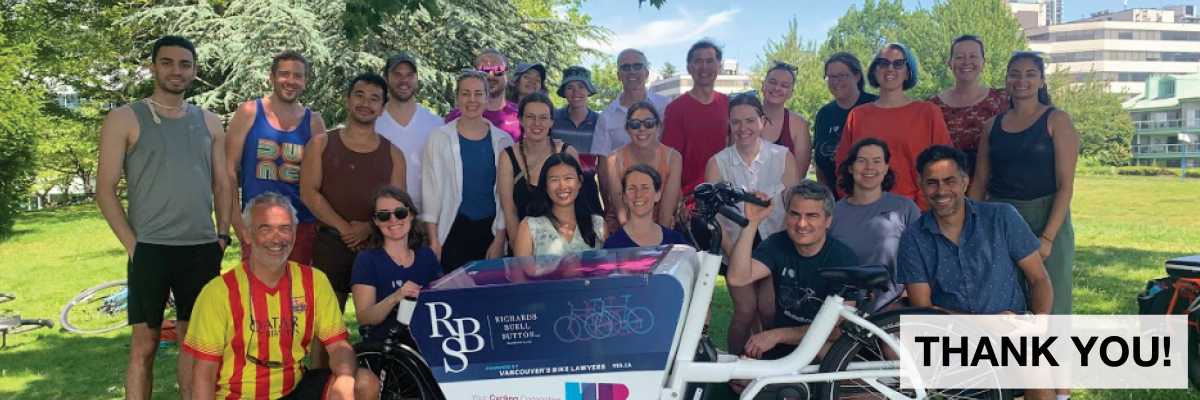
We'd like to thank our Board of Directors:
- President: Derik Wenman
- Vice President: Jeff Leigh
- Treasurer: Matthew Alexander
- Secretary: Matt Strand (to Sept 2021) Geneviève Bowers (from Sept 2021)
- Directors at Large: Jean Lawson • Julia Gellman • Nadia Fourik • Özge Yazar • Paul Kennedy • Peter Sales • Tai Silvey • Carlos Alonso • Will Skinner (to Sept 2021) • Julie Facchin (to Sept 2021) • Sherry Zhao (to August 2021) • Shareen Chin (to July 2021) • Michael Koski (to June 2021)
Our Board Committees:
Regional Advisory Committee Members: Jeff Leigh, Nadia Fourik, Carlos Alonso, Julia Gellman, Jean Lawson
The Regional Advisory Committee (RAC) is a Board of Directors committee that works with staff to help strengthen local committees and also ensure that regional priorities and interests are considered in HUB Cycling advocacy work. The RAC leads advocacy work on key active transportation infrastructure gaps such as the Massey Tunnel replacement project. The RAC leads our Priority Gap List and associated Gap Map, within HUB Cycling and across all local committees. The RAC also works to build and maintain strong relationships with regional and provincial authorities such as the Ministry of Transportation and Infrastructure, Translink, and Metro Vancouver.
Board Development Committee Members: Matt Strand, Özge Yazar, Geneviève Bowers, Peter Sales, Paul Kennedy
The Board Development Committee (BDC) helps develop an effective and efficient Board that operates in a fair and encouraging environment. Some of the BDC's duties include identifying the skills and processes needed for a successful board, ensuring each Director's skills are appropriately utilized and ensuring the scope of activities undertaken by HUB Cycling's Board work towards getting more people cycling more often. This Committee typically meets monthly. Learn more about HUB's board at https://bikehub.ca/about-us/annual-general-meeting/join-the-board
Operations Committee Members: Derik Wenman, Tai Silvey, Matt Alexander
The Operations Committee's mission is to ensure that operational activities are chosen and executed to best deliver on the organization's objectives. The committee is made up of the Director of Operations or Executive Director, and select members of the board. The committee reviews and provides guidance on key operations activities, including; budgets and finances, risk management, organizational structure and performance, legal and IT matters, and strategic partnerships. The matters that require more visibility are elevated to the board. The committee is also tasked with ensuring that the staff and volunteers are engaged, high performing, and working in a fun, respectful and supportive environment.
And our Organizational Members:
- Allan McGavin Sports Medicine Clinic Physiotherapy
- BCAA
- Better Environmentally Sound Transportation (B.E.S.T)
- Boffo Developments Ltd.
- Cadillac Fairview
- DoorDash
- Electronic Arts (EA)
- HiVE Coworking
- Hudson Pacific Properties
- Lafarge
- Modo Car-Coop
- Oxford Properties
- Recycle BC
- Richards Buell Sutton LLP
- Uber
Thank you for helping us get more people cycling more often!
Past Annual Reports:
